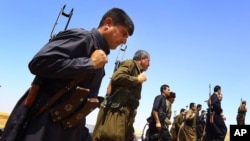Combatants do not usually tell opponents their attack plans. But that's what appears to have happened Thursday when a U.S. military official explained when and how an Iraqi and Kurdish military force would push to recapture Mosul from Islamic State fighters.
“I really see this more as a combination of psychological warfare and wishful thinking,” said Michael Weiss, co-author of "ISIS: Inside the Army of Terror" and a columnist for Foreign Policy magazine. “But is it going to be enough to out ISIS from Mosul? I don’t think it is.”
Weiss said the U.S. official’s comments came as the Iraqi government is negotiating with former members of the late Saddam Hussein’s Baath party who have joined Islamic State. He said the Iraqi government hopes to strike a deal to get them to lay down their weapons and withdraw from Mosul in order to prevent the “ensuing bloodbath.”
Said Mamozini, a Peshmerga commander in the Bashiqa fighting area near Mosul, told VOA the U.S. decision to go public with the battle plan “creates fear” among the Islamic extremists there. He added it was possible some people could turn away from Islamic State when they heard how outnumbered they would be, weakening the group’s presence in Mosul even further.
No easy fight
Despite the estimated 10:1 fighting ratio, Weiss said the battle for Mosul would be a “very nasty and bloody campaign” that would cause many casualties on both sides. By April, Islamic State militants will have controlled the city for several months, giving them plenty of time to lay all kinds of traps and bury explosive devices.
“These guys are very good at tearing up concrete and blacktop road systems and planting bombs,” Weiss said. “The minute these [Iraqi] convoys roll in, they are going to get blown up.”
Mamozini was confident in the fighting abilities of Peshmerga fighters, saying that “without Kurdish participation, Mosul would not be liberated.”
But the Peshmerga commander worried that Iraqi forces training in the north would not be capable of conducting the large war required to retake Mosul, and he called for more forces from Baghdad to help win the fight. So far, 2,000 troops have completed U.S. training, with 3,200 Iraqis currently in training.
Weiss warned the coalition might be expecting too much.
“You have three competitive sectarian interests in Iraq," he said. "Getting two of them to partner together, meaning the Kurds and the Shi’ite militias, is already a Herculean task. Getting both of them to defeat the other one, meaning ISIS, is all near impossible.”
US ground troops
U.S. officials said they had not yet decided whether small numbers of U.S. military advisers would be needed on the ground near Mosul to direct air support.
However, the Peshmerga commander said U.S. ground forces would be needed to retake the city, along with constant coalition air attacks on Islamic State positions in Mosul.
Weiss and U.S. military officials have noted concerns that a neutral force is needed to retake the city because the Mosul population most likely will not welcome the Kurds nor the Shi’ite military as a liberating force. Strains between Sunni and Shi’ite under the leadership of former Iraqi Prime Minister Nouri al-Maiki helped open the door of dissent that allowed Islamic State to overrun the majority Sunni city.
“The U.S. is the only credible military force that can fight ISIS without alienating the Sunni population,” Weiss said.
VOA’s Kurdish service contributed to the report.




